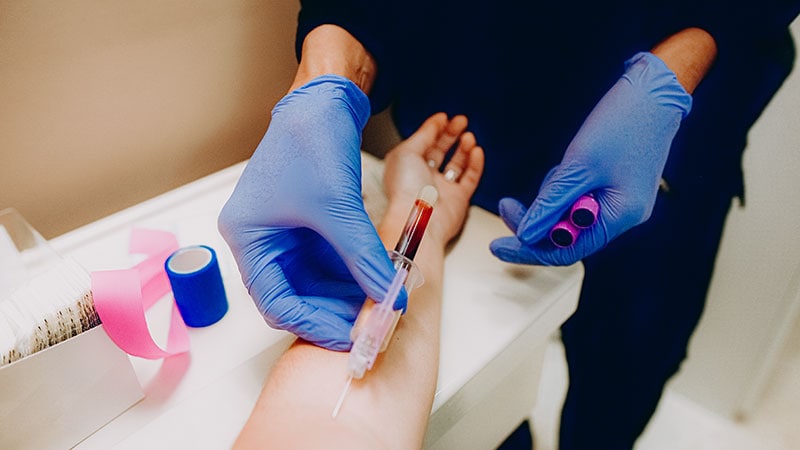Blood Biomarker Panel May Predict Parkinson's Disease Onset Up to 7 Years in Advance
Core Concepts
A panel of eight blood biomarkers can identify patients who will develop Parkinson's disease up to 7 years before the onset of motor symptoms or dementia with Lewy bodies.
Abstract
The study aimed to develop a blood-based biomarker panel that can predict the development of Parkinson's disease (PD) years before the onset of clinical symptoms. The researchers performed a proteomics analysis of plasma samples from patients with de novo PD and healthy controls, identifying 23 dysregulated proteins involved in inflammatory pathways, Wnt-signaling, and coagulation cascade.
They then constructed a targeted mass spectrometry proteomic assay with 121 proteins and applied it to additional samples, including those from patients with other neurological diseases and isolated REM sleep behavior disorder (iRBD). This led to the identification of a panel of 8 proteins (GRN, MASP2, HSPA5, PTGDS, ICAM1, complement C3, DKK3, and SERPING1) that could accurately identify PD patients and predict with 79% accuracy which iRBD patients would convert to PD up to 7 years before motor symptom onset.
The biomarker panel was also found to correlate with clinical scores on the Unified Parkinson's Disease Rating Scale and Mini-Mental State Examination. The researchers plan to validate the findings in a larger cohort and note that the ability to identify early PD could aid in recruitment for preventative clinical trials and potentially lead to new treatment options targeting the dysregulated pathways.
Blood Biomarker Panel May Predict PD Years in Advance
Stats
The study identified 23 distinct proteins that were consistently dysregulated in patients with Parkinson's disease compared to healthy controls.
The final biomarker panel included 8 proteins: GRN, MASP2, HSPA5, PTGDS, ICAM1, complement C3, DKK3, and SERPING1.
The biomarker panel could accurately identify 100% of Parkinson's disease patients and predict with 79% accuracy which patients with isolated REM sleep behavior disorder would convert to Parkinson's disease up to 7 years before motor symptom onset.
Quotes
"This is a big step because for the first time we are working with peripheral fluids and have a test that can predict something in an objective way."
"We know that isolated REM sleep disorder is a strong predictor of the disease and we wanted to see if maybe there is something in common. And to our surprise, they had a lot in common with the patients with Parkinson's. It's not just that they are at risk, but they already have blood that indicates the pathological processes in Parkinson's disease have already taken place."
Key Insights Distilled From
by Patrice Wend... at www.medscape.com 06-18-2024
https://www.medscape.com/viewarticle/blood-biomarker-panel-may-predict-parkinsons-years-advance-2024a1000bck
Deeper Inquiries
How could the early identification of Parkinson's disease using this biomarker panel impact the development of disease-modifying treatments?
The early identification of Parkinson's disease using this biomarker panel could significantly impact the development of disease-modifying treatments in several ways. Firstly, by identifying individuals at high risk of developing Parkinson's up to 7 years before the onset of motor symptoms, researchers and clinicians can intervene at an earlier stage of the disease. This early intervention could potentially slow down or even halt the progression of the disease, leading to better treatment outcomes. Additionally, the identification of specific proteins involved in inflammatory pathways, Wnt-signaling, and the coagulation cascade could provide valuable insights into the underlying pathophysiology of Parkinson's disease. This knowledge could guide the development of targeted therapies that aim to modify these pathways, potentially leading to more effective disease-modifying treatments for Parkinson's patients.
What are the potential limitations or challenges in implementing this biomarker panel in clinical practice, such as issues related to ethics and counseling?
While the use of this biomarker panel for early identification of Parkinson's disease shows great promise, there are several potential limitations and challenges in implementing it in clinical practice. One major challenge is the ethical implications of predictive diagnosis. Providing patients with information about their risk of developing Parkinson's disease years before symptoms appear could lead to psychological distress and anxiety. Therefore, proper counseling and support mechanisms would need to be in place to help individuals cope with the emotional impact of such predictive testing. Additionally, there may be concerns about the overdiagnosis of Parkinson's disease based on biomarker results, leading to unnecessary treatments and interventions. Ensuring the accuracy and reliability of the biomarker panel, as well as clear guidelines for its use in clinical practice, will be essential to address these ethical and counseling challenges.
What other neurodegenerative or neurological conditions could this biomarker panel potentially be applied to for early detection or prediction of disease onset?
The biomarker panel developed for early identification of Parkinson's disease could potentially be applied to other neurodegenerative or neurological conditions for early detection or prediction of disease onset. Conditions that share common pathophysiological pathways with Parkinson's disease, such as Alzheimer's disease, Huntington's disease, and amyotrophic lateral sclerosis (ALS), could benefit from the use of this biomarker panel. By identifying specific proteins involved in inflammatory pathways, Wnt-signaling, and the coagulation cascade that are dysregulated in Parkinson's disease, researchers could investigate whether similar dysregulations occur in these other neurodegenerative conditions. Early detection of these conditions could lead to earlier interventions and potentially more effective treatments, improving outcomes for patients with these debilitating diseases.
0
